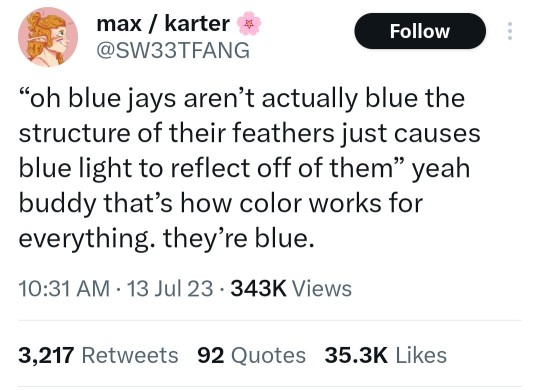#*insert definitions that only matter in English where gelato is a loanword*
Explore tagged Tumblr posts
Text
This is one of those Jimmy Neutron sodium chloride moments where I'm like. Really frustrated because some people who are in scientific fields choose to be pedantic for pedantry's sake and forget how human language works in the process.
Definitions are human-made and exist based entirely on their purpose in whatever context you're considering. The distinction between "blue as a result of the presence of pigment" and "blue as the result of texture" is relevant in some contexts, and irrelevant in others. It's like using months instead of years to describe a baby's age: useful and appropriate when you're talking to your pediatrician, mildly inconvenient to slightly annoying when you're talking to someone who was just trying to make casual conversation and asked how old your baby is.
Is it useful, in some contexts, to keep in mind that a blue object doesn't always contain any blue pigment? Sure, absolutely! But is it always appropriate to say "actually, such and such isn't actually blue"? Not necessarily! The way we colloquially assign colors to objects doesn't depend on the inherent physical or chemical properties of that object, but on what wavelengths end up hitting our retinas and send signals to our visual cortices. In that regard, our eyes don't give a flying fuck how that color was generated - the end result is what is meaningful in a general context. Otherwise, we could start being equally pedantic about iridescence because "actually, this substance doesn't contain a pigment for every single color of the rainbow, it's just an illusion due to its microscopical structure". Which doesn't really enhance our understanding of the world so much as it unfairly associates common parlance with ignorance.
And it really is unfair, when you think about it. Language is malleable, and definitions are context-dependent. Why is a scientist's first instinct to go "well akschwally," instead of holding onto that same curiosity that drove them to their field and asking themselves "why is it that some distinctions are acceptable in my field of study, but elicit a negative emotional response in some people outside of it?"? It's easy to dismiss the problem as "oh this society has a literacy problem" or "oh they're just being reactionary" or "oh how sad, they don't value knowledge the same way I do". But sometimes, maybe, it is you who still has some things to learn about how humans work. Give people the grace they deserve. Human curiosity isn't the exclusive intellectual property of the scientific community.

#there's a reason that jimmy neutron scene became a meme just saying#sometimes it's sodium chloride and sometimes it's just plain old table salt#they're the same thing and yet they're not#poetry and metaphor are just as important in human communication as cold hard facts(tm)#it's really a shame they don't teach that in scientific courses#something vital gets lost in translation when scientists attempt and fail to share their knowledge with the world#it reminds me of a tiktok i saw#by this US-american woman who lives in Italy#and she was responding to a comment that explained to her that 'gelato' is a generic term for ice cream and all adjacent desserts#and she went on about how well actually no ice cream and gelato are different because-#*insert definitions that only matter in English where gelato is a loanword*#and i was so fucking frustrated because I was like#those definitions only make sense in English because Italian-style ice cream isn't the default in English speaking countries#and so 'gelato' is exoticized as its own very specific thing#when in Italy we call everything 'gelato' whether it's artisanal or not#this is what i mean when i beg for people to be mindful of how language works
88K notes
·
View notes